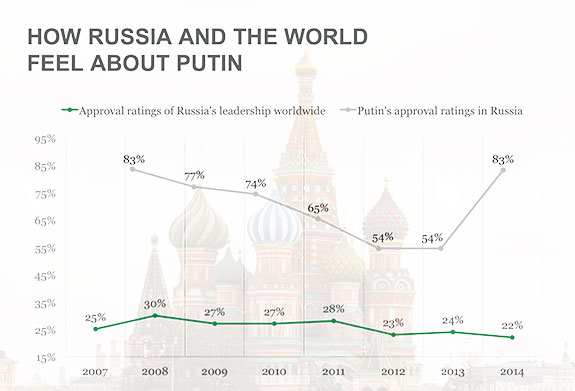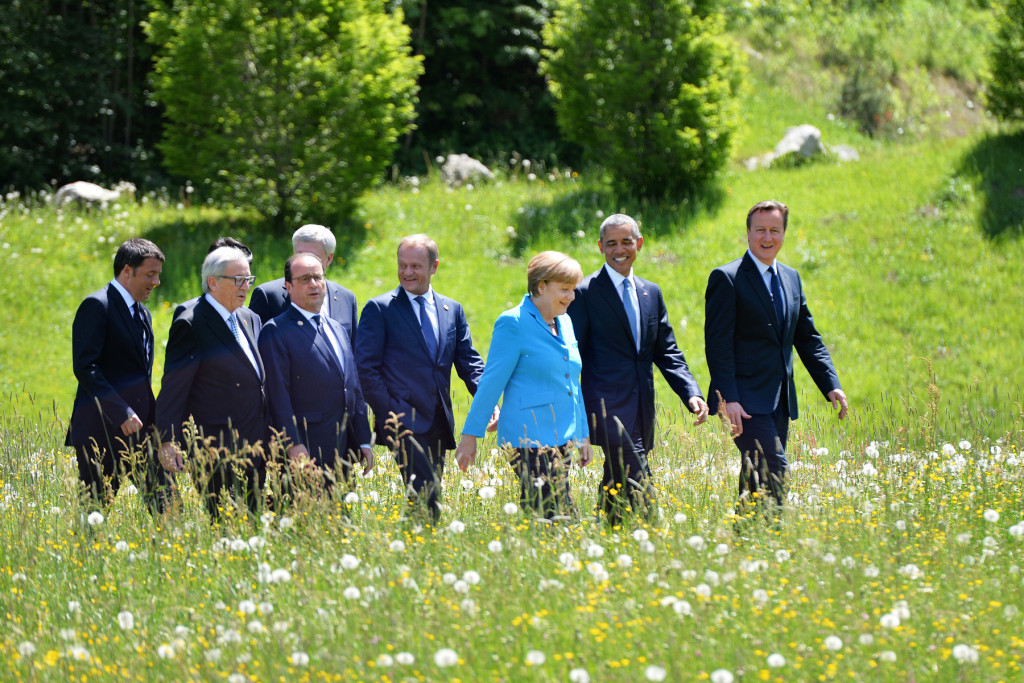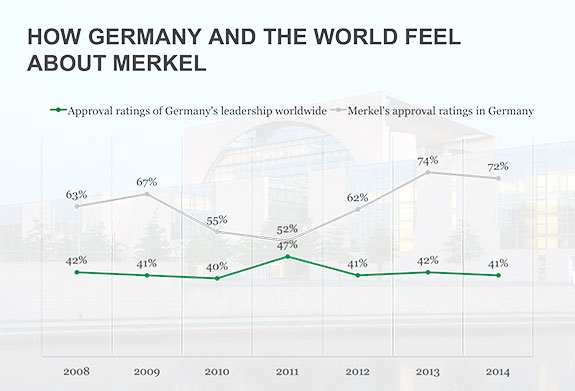Russia was arguably the least popular world power in 2014. According to new data from the Gallup World Poll, Russian leadership has a median international approval rating of 22 percent and a 36 percent disapproval rating, the highest of any country. This is cannot be a surprise following the annexation of Crimea, covert intervention in Eastern Ukraine, and assassination of opposition leader Boris Nemtsov.

As a direct result of international disapproval, Russia’s membership in the G8 was suspended in March 2014, further isolating the country during a time of economic hardship. Negative perceptions of Russian leadership are immediately affecting the country’s ability to provide for its citizens as sanctions begin to bite.
Despite international ire, or perhaps as a result of it, domestic approval of Russian leaders is at an all-time high: 83 percent. It appears that the Russian people are unfazed by the ramifications of Russian action abroad. Not only is Russia not taking part in the G7 conversations in June, but the ruble has lost over half of its value since international sanctions took effect and the European Union has launched an investigation into Gazprom.
In the short term, President Vladimir Putin’s tale of Western aggression can placate the people and inspire a xenophobic nationalism. However, Russia cannot afford this isolation in the long run.
International organizations like the G7 offer countries the opportunity to appeal to their neighbors, and find solutions to the most challenging of international problems. Started in 1975 in the aftermath of the first oil shock, it was a forum to discuss the global economy and international financial problems. It has since been broadened to address foreign, security, and development policy issues. Held in Bavaria at Schloss Elmau this year, member states will also address the 2015 UN conferences, the post-2015 agenda, energy security, marine governance, global health, retail and supply chain standards, and women’s empowerment.

G7 membership is currently being held out as a carrot in seeking to alter Russian behavior. In the absence of the dialogue that comes with participation in this elite group, the West should look for alternate paths to link private sector leaders of both countries. One institution that could play a constructive role is a new business school supported by Russian business leaders. SKOLKOVO, the Moscow School of Management, is an example of a new institution that can foster dialogue and lay the groundwork for further economic cooperation when the political climate improves. The new Dean, Andrei Sharanov, understands the importance of strengthening institutional ties with US and European counterparts at a time like this.
During the Cold War, business leaders were able to play a constructive role, though not a decisive one, in pursuing a thaw. Ideally, with the influence of private sector leaders, Russia will take the necessary steps to rejoin the G7 and set a foundation for the kind of economic policies that will benefit both Russia and the West over the long term. The pivotal question is: will Russia seek to promote an alternate network of economies that seek to rebuff the influence of the United States and the EU?
Germany will continue to play a key role in outcomes of this question. This is not merely as a result of the regular contact between Chancellor Merkel and President Putin, but also as a result of the linkages between these two economies. The Chancellor’s political capital is reflected in the perception of German leadership domestically at an eight year high of 71 percent and a relatively strong international approval rating of 41 percent. However, there are limits to German influence in bridging the divide as reflected by the fact that 66 percent of Russians possess a dim view of Berlin, virtually tied as the highest disapproval rating of German leadership.

The G7 can function without Russian participation. In fact, some would argue that it will now represent a network of countries with more common democratic values. It would not be ideal to readmit Russia based on symbolism or a false hope that its international behavior will be completely altered as a result. The danger is rather that a more isolated Russia, unencumbered by international associations and interests, will become bolder in its defiance of international norms.
Let us hope that Russia earns readmission by changing its actions and intentions. Until then, we must look for alternate vehicles to keep lines of dialogue open to prevent miscalculation and to begin restore trust.
This article originally appeared in Diplomatic Courier’s special print G7 Summit 2015 Edition.
















